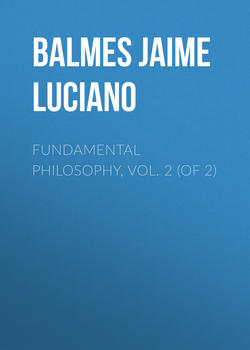Читать книгу Fundamental Philosophy, Vol. 2 (of 2) - Balmes Jaime Luciano - Страница 25
BOOK FOURTH.
ON IDEAS
CHAPTER XXV.
IN WHAT DOES UNIVERSAL REASON CONSIST?
Оглавление156. What is universal reason? If we consider it as a simple idea, as an abstraction from individual reason, as something separate from them, but not real, we strike upon the very rock we try to shun. We endeavor to assign a cause of the unity of human reason; and appeal to universal reason; and then to explain in what universal reason consists, we recur to an abstraction from individual reason. Evidently, this is a vicious circle; we place the cause of a fact so fruitful in an abstraction, in a generalization of the very thing we have to explain; we assign to a great effect a cause totally insufficient, which has no existence out of our understanding, and which only grows out of the very effect whose origin we are investigating.
157. A real fact must have a real principle; a universal phenomenon must have a universal cause; a phenomenon independent of all finite intelligence must spring from some cause independent of all finite intelligence. There is, then, a universal reason, the origin of all finite reason, the source of all truth, the light of all intelligences, the bond of all beings. There is, then, above all phenomena, above all finite individuals, a being, in which is found the reason of all beings, a great unity, in which is found the bond of all order, and of all the community of other beings.
The unity, therefore, of all human reason affords a complete demonstration of the existence of God. The universal reason is; but universal reason is an unmeaning word, unless it denote an intelligent, active being, a being by essence, the producer of all beings, of all intelligences, the cause of all, and the light of all.
158. Impersonal reason, of which some philosophers speak, is an unmeaning word. Either there exists a reason distinct from ours, or there does not: if it does exist, it is not impersonal; if it does not exist, it is impossible to explain the community of human reason: this community would be to us a phenomenon, which we might call impersonal reason, or any thing else we pleased, without it therefore being possible for us to assign it any origin: it would be an effect without a cause; a fact without a sufficient reason.
159. The understanding extends to a world of possibilities, and there discovers a connection of necessary relations, some of dependence, others of contradiction: but if there were no reality whereon to found the possibility, this would be an absurdity; if nothing existed, nothing would be possible.
Upon nothing, nothing can be founded; consequently, not even possibility. The connection of necessary relations which we discover in possible beings, must have a primitive type to which they refer: but in nothing there are no types.
160. The assemblage of human understandings cannot establish possibility. No one of them considered isolately is necessary to general truth; and all together cannot have what no one of them has. We conceive necessary truth, absolutely abstracted from the human understanding: individual understandings appear and disappear, but work no change in the relations of possible beings: on the contrary, the understanding needs, in order to exercise its functions, a collection of pre-existing truths, and without them it cannot work.
What any one individual understanding requires, all require. Their union does not increase the strength of each one: since this union is nothing more than an assemblage formed in our mind, and may not correspond to any thing in reality except the individual understandings, and their respective strength.
161. Necessary truths, therefore, exist before human reason; but their pre-existence is an unmeaning word, if they be not referred to a being, the origin of all reality, and the foundation of all possibility. There is then no impersonal reason properly so called; there is a community of reason in so far as one and the same light illumines all finite intelligences; God the creator of them all.
